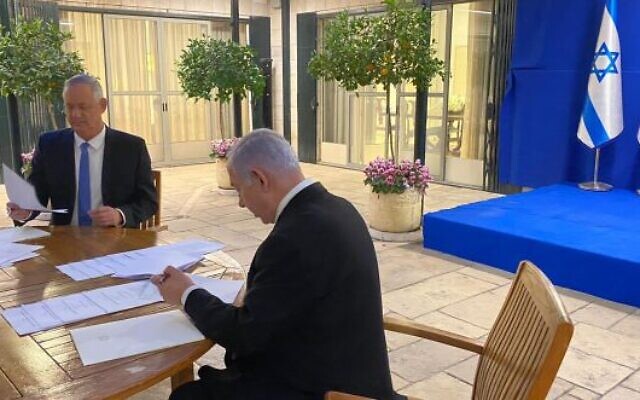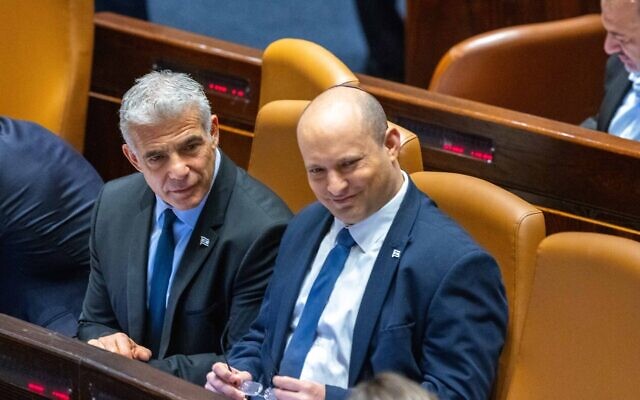It’s a strange new look for Israel’s largest political party. The accusations of infidelity and mental illness leveled against political rivals are a thing of the past. The caustic Likud Twitter mobs may not be silent, but they’re certainly calmer. The party’s campaign no longer focuses laser-like on Benjamin Netanyahu.
No, there’s a decidedly gentler and warmer campaign underway in what Israelis wryly refer to as “round five.” For the first time in years – at least since the 2015 election – Likud is running on specific policy proposals. Campaign videos have gone from sinister or panic-stricken – Isaac Herzog letting Islamic State jihadists into Israel – to charmingly self-deprecating. In one campaign video after another, party leader Netanyahu’s new message to Israelis seems to be, “But forget about me, let’s talk about what worries you.”
One campaign video, Netanyahu’s new year’s greeting to the Israeli Jewish public, encapsulates the new tone.
Over the course of a minute and 50 seconds, Netanyahu’s quips come fast. “Happy new year to those who completed a marathon this year. And happy new year to their friends who are going to spend the next year hearing about how they completed a marathon.”
He gently mocks his opponents: “A good year to Naftali [Bennett] from Ra’anana. We wish you success on your new journey.”
Get The Times of Israel's Daily Edition by email and never miss our top stories
But mostly he makes fun of himself, recalling old allegations of overspending government funds on, among other things, gourmet pistachio ice cream: “[Happy new year] to the lucky ones who managed to score a pistachio crunch cone. I love pistachio!”
His basic harmlessness established, the former premier comes to the heart of the video, which is also the essential message of the new campaign. After wishing a “real” happy new year to the soldiers and healthcare workers, Netanyahu turns to his own right-wing voters.
“Happy new year to the right-wing voters who last year said to themselves, ‘What’s the worst that could happen? I’m going to the beach on Election Day.’
“You saw what happened. This year, we take these elections personally. If every right-wing voter who voted in the last election brings a right-wing voter who didn’t vote in the last election, we will win this thing in a big way.”
The best of times, the worst of times
The new campaign may sound upbeat and whimsical. It’s not. It’s a calculated, anxious effort to repair the damage of Netanyahu’s past campaigns.
In the March 2020 election – “the third round” – Likud won 1.35 million votes at the ballot box, the most ever won by an Israeli political party. It marked an extraordinary rush on the polls by Netanyahu’s supporters, adding nearly a quarter-million new votes to Likud’s showing just six months earlier, in September 2019’s round two.
But it wasn’t enough. The other side rallied almost as dramatically.
Benny Gantz’s center-left Blue and White alliance grew by almost 70,000 votes to 1.22 million, the second-highest draw in Israeli history. The Arab Joint List’s vote tally surged 24% to an unprecedented 580,000.
Netanyahu had done well, but so had his rivals. The deadlock remained.

Blue and White leader Benny Gantz (left) and Prime Minister Benjamin Netanyahu sign their unity government agreement on April 20, 2020 (courtesy)
To break the deadlock, Netanyahu proposed and then signed a prime ministerial rotation agreement with Gantz in May 2020, vowing to carry out the promised transfer of power “without tricks and without shticks.”
But it was not to be. By the unprecedented expedient of refusing to pass a state budget for the 2020 fiscal year, Netanyahu forced the Knesset to dissolve early, believing that by conning Gantz into splintering his party’s partnership with Yair Lapid’s Yesh Atid he’d assured himself the long-delayed victory.
Netanyahu was right to expect a win. Gantz’s Blue and White was broken up after his decision to pursue a unity government with Netanyahu. The Arab parties had dissolved their alliance and polls showed Arab turnout was likely to fall precipitously. Netanyahu faced an opposition in freefall.
But his plans were thwarted nonetheless – and this time, by his own supporters. As the center-left bickered and Arab turnout dropped a whopping 34%, a Netanyahu poised on the cusp of victory was forced to watch as his own recent supporters abandoned him in droves.
Likud’s election-day tally fell by 285,000 votes, a 21% drop.
Many interpreted the drop as a signal of general exhaustion with the never-ending elections. But the fall was too focused for such a generalized explanation. It was overwhelmingly concentrated in just two places: the 285,000 votes lost to Likud and the 202,000 lost to the Arab parties. Each alone was a larger fall than the 180,000 votes, or four percentage points, lost to the general turnout among all parties. (That is, other parties gained while Likud shrank.)
A more likely explanation, consistent with what voters were telling reporters on the streets of Likud strongholds like Dimona or Beersheba at the time, was that many Netanyahu voters were frustrated with his unsuccessful and increasingly acerbic campaigns, and perhaps, as even pro-Likud media personalities were suggesting at the time, more than a little galled or embarrassed over his mistreatment of Gantz. As Likud shed votes, the most vociferous right-wing critics of Netanyahu — Yamina and the newly established New Hope — gained 10 new Knesset seats between them.
Winning them back
Netanyahu is once again set to win. The center, the left, and the broad array of Arab factions are all deeply divided and distrustful of one another. Several left-wing and Arab parties now hover just above (and in the case of Balad, below) the 3.25% vote threshold a party must pass to enter the Knesset. Arab turnout is expected to be even lower than last time, based on Arab parties’ internal polling.
And while the center-left and Arab factions crumble, Netanyahu has gone to great lengths to ensure the same doesn’t happen on the right. He has engineered alliances among even the most extreme elements of the right, such as the fast-rising, Kahana-inspired Otzma Yehudit party that stands poised to become a major right-wing powerbroker.

Otzma Yehudit head Itamar Ben Gvir (left) and Religious Zionism leader Bezalel Smotrich submit their joint electoral list to the Central Election Committee at the Knesset on September 14, 2022. (Courtesy)
The stars seem to be aligning at long last. Yet Netanyahu still faces the same vulnerability that cost him a similarly inevitable victory last time: The hundreds of thousands of supporters who abandoned him at the moment of truth.
The past four elections have served as a kind of natural experiment testing the mobilizing power among right-wing voters of his corruption trial, of campaigns centered on the Mizrahi-Ashkenazi divide, of dire warnings about the left or a “Muslim Brotherhood” takeover. At each vote, Netanyahu bumped up against the same stubborn ceiling. He’d focused on rallying the base, but the base was never enough for victory.
Netanyahu has never won a majority in polls that tested “fitness to be prime minister.” He leads the pack of party leaders, but never passes the 50-percent mark. A plurality is significant in a multi-party system, but it’s not enough if your opponents unite.
From fisticuffs to daycare subsidies
And so Likud is pivoting.
It is keenly aware of the costs of its vitriolic campaigns. It is aware, too, of a new constituency that may suddenly be up for grabs.
Former Likudniks on the center-right who voted for New Hope and Yamina may find it hard to choose a party in next month’s race. Yamina has collapsed, its remnants now helming the old, nearly defunct Jewish Home party. Gideon Sa’ar’s New Hope has joined with Gantz’s Blue and White, moving further leftward than many ex-Likudniks might be comfortable following. Could a gentler campaign attract them back?
Likud and its leader are trying.
On August 3, for the first time in years, Netanyahu presented a detailed economic program that the party would be running on. The campaign wouldn’t be about Netanyahu himself or the danger posed by a sinister leftist-Arab alliance, but about a “return to stability” and a commitment to long-delayed reforms.
He laid out a wish list of said reforms: reducing tariffs and import regulations to allow cheap imports to drive down consumer prices; streamlining the housing construction approval process; lowering the cost of electricity, gasoline and water (apparently through subsidies or price controls); subsidizing land purchases for young people seeking to build homes; freezing municipal property taxes for a year to help offset inflation; and most dramatically, lowering the age of free public education from 3 years to zero and offering state-funded daycare from birth.
For the first time since the 2015 election, Likud wants to talk about substance.
It has also, for the first time in memory, turned forcefully against its most aggressive and disreputable activists.

Likud activist Rami Ben Yehuda is seen punching retired Col. Rami Matan at a bridge near Jerusalem, September 24, 2022. (Screenshot: Twitter, used in accordance with Clause 27a of the Copyright Law)
When one infamous campaign rabble-rouser, Rami Ben Yehuda, was caught on camera last month apparently assaulting a left-wing demonstrator, the Likud campaign quickly announced he would be fired. Ben Yehuda’s defenders in the party insisted he hadn’t started the altercation, and that the 13 seconds of viral footage being shared on social media were deliberately edited to exclude the abuse he’d received from those he attacked. But neither Ben Yehuda nor his Likud supporters had gotten the message. Ben Yehuda, filmed lashing out while shouting “traitors,” had become a symbol of the party’s intemperate campaigning. In the new race to win back disgusted ex-supporters, Ben Yehuda and his coterie were a liability.
“I think Likud did the right thing when it fired Rami Ben Yehuda from the campaign,” Likud MK Miki Zohar, a veteran of Likud’s rough-and-tumble campaigning style, told Channel 13 on Saturday, “because he redirected our energies to bad places, to violent places.”
Someone to run against
Until he was forced out of power in May 2021, it made sense for Netanyahu to focus his campaigns on abstractions like identity politics, sinister plots and alleged mental illnesses of his opponents. Incumbency may have some advantages — incumbents often dominate the news cycle and can set the public agenda in the run-up to election day — but for Netanyahu it was an obstacle. After 12 years in power, an incumbent can hardly promise change or run on issues they’d failed to tackle in so long a tenure.
Likud’s new economic platform is a case in point. It’s an implicit critique of Likud’s years in power. The protectionist tariffs and import regulations that Netanyahu now promises to remove were expanded during his government, and he canceled an attempt to pass a similar reform in 2015-16. The famously slow process for obtaining construction permits for new homes grew worse during his term, driving the waiting time to some 300 days, among the longest in the developed world. Traffic congestion worsened, basic goods became among the most expensive in the West, and on and on.
Nor does Netanyahu explain in any detail how he plans to fulfill some of his most generous promises. His promise to expand state education funding down to age 0 has been priced by some economists at some NIS 19 billion ($5.4 billion) annually, a 30% increase to the national education budget. He argued in turn that the total cost will be far lower, some NIS 6-8 billion ($1.7-2.3 billion) annually, and that the program would be phased in over four to five years and could therefore be funded by government cost-cutting.
Illustrating Netanyahu’s incumbency problem, one Kan reporter retorted, “If it’s so simple, and so cheap, and so doable – what stopped Netanyahu from doing it in his 12 years in office?”
The longer he’s out of power, the more difficult Netanyahu’s political position will become. His Haredi allies are already quietly reconsidering their support for the simple reason that their institutions cannot afford to spend more years in the opposition cut off from the subsidies that come from coalition membership. To hold on to his allies, Netanyahu must win on November 1. His 18 months in the opposition have become politically dangerous.

File: Foreign Minister Yair Lapid (left), the incoming interim prime minister, and outgoing premier Naftali Bennett (right) sit in the Knesset during voting to dissolve parliament for new elections, on June 30, 2022. (Olivier Fitoussi/Flash90)
But they were also liberating. Netanyahu can finally build a campaign that promises to address all that the Lapid-Bennett government had failed to fix in its, well, 18 months in power. The unresolved economic and administrative problems that beset ordinary Israelis are no longer a political albatross to be sidestepped via identity politics and populism, but a rich source for campaign themes that can appeal beyond Likud’s loyal but insufficient base.
It is perhaps the central irony of this election: At the tail end of a 43-month, five-election political deadlock, the very fact that he can mount such a campaign is a gift from those who pushed him out of power, who gave him someone to run against.


